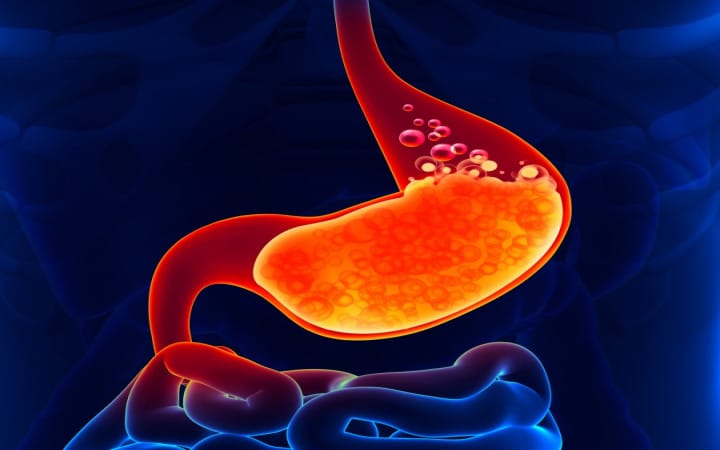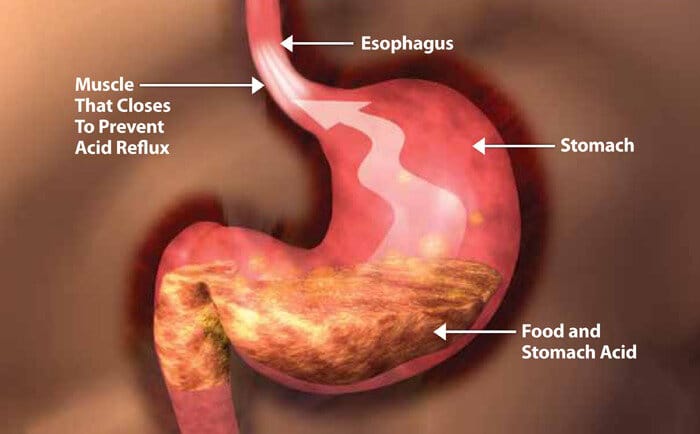Stomach Hydrochloric Acid: Explore Facts About Your HCL!
Stomach acid's digestive dance: Explore the intricacies of hydrochloric acid in the stomach. Uncover its dynamic role in breaking down food, aiding digestion, and promoting nutrient absorption. Discover the importance of maintaining a healthy balance for overall digestive well-being. 🍽️🩸

Key Points
- Highly Concentrated Acid: Stomach acid is incredibly potent, with a pH level ranging from 1.5 to 3.5. This acidity is vital for breaking down food particles and activating digestive enzymes.
- Gastric Glands Production: Stomach acid is primarily produced by specialized cells called parietal cells, located in the gastric glands of the stomach lining. These cells secrete hydrochloric acid along with intrinsic factor, essential for vitamin B12 absorption.
- Key Role in Immune Defence: Beyond digestion, stomach acid serves as a formidable barrier against harmful pathogens ingested through food. Its acidic environment effectively kills bacteria, viruses, and parasites, protecting the body from infections.
- Stimulation by Gastrin: The production of stomach acid is regulated by the hormone gastrin, released by the stomach lining in response to the presence of food. Gastrin triggers the release of hydrochloric acid, initiating the digestive process.
The digestive system is a marvel, orchestrating a complex symphony of processes to break down food into absorbable nutrients. At the heart of this intricate dance is stomach hydrochloric acid or HCL, a potent substance crucial to digestion.
Stomach hydrochloric acid, a vital component of the digestive system, plays a crucial role in breaking down food and facilitating nutrient absorption. Found in the gastric glands of the stomach lining, this powerful acid is essential for maintaining optimal digestive function.
Without stomach acid, the process of digestion would be significantly impaired. From the moment food enters the stomach, hydrochloric acid works tirelessly to break down complex molecules, particularly proteins, into smaller, more digestible components. This breakdown is essential for the absorption of nutrients further along the digestive tract.

The importance of stomach acid extends beyond mere digestion. It also serves to activate various digestive enzymes, such as pepsin, which further aid in the breakdown of proteins. Additionally, stomach acid creates an acidic environment that helps to kill harmful bacteria and pathogens present in food, protecting the body from potential infections.
Factors Influencing Hydrochloric Acid Production
Stomach acid production is a finely tuned process influenced by various factors that can impact its levels. Understanding these factors is crucial for maintaining a healthy balance of hydrochloric acid in the stomach.
1. Age
As individuals age, there is a natural decline in the production of stomach acid. This age-related decrease can lead to less efficient digestion and absorption of nutrients.
2. Stress Levels
The demands of modern life can take a toll on digestive health. High-stress levels, whether due to work, personal life, or other factors, can contribute to a reduction in stomach acid production. Stress management is key to supporting optimal digestive function.
3. Diet
The food we consume directly affects stomach acid production. Certain dietary choices, such as a diet high in spicy or greasy foods, can stimulate the production of stomach acid. On the flip side, a diet lacking in essential nutrients may contribute to lower acid levels.
Maintaining a balanced and nutritious diet is essential for supporting the body's natural ability to produce adequate stomach acid.
Symptoms of Low Stomach Acid
Low stomach acid levels can manifest in various symptoms, often causing discomfort and affecting overall digestive well-being.
1. Indigestion
Insufficient stomach acid can result in indigestion, characterized by a feeling of fullness, bloating, and discomfort after meals. Food may linger in the stomach for an extended period without proper breakdown.
2. Bloating
Inadequate stomach acid can lead to the fermentation of undigested food in the stomach, causing bloating. This can contribute to a distended and uncomfortable feeling.
3. Nutrient Deficiency
Low stomach acid hinders the proper absorption of essential nutrients like iron and vitamin B12. Over time, this deficiency can lead to health issues, including anemia and neurological complications.
Recognizing these symptoms is vital for addressing potential low stomach acid levels. Seeking professional advice and making lifestyle adjustments can help restore a healthy balance of stomach acid, promoting optimal digestion and overall well-being.
Health Impacts of Excessive Stomach Acid
While stomach acid is crucial for digestion, an excess of it can lead to various health issues, impacting both the digestive system and overall well-being.
1. Acid Reflux
Excessive stomach acid can result in acid reflux, a condition where the acidic contents of the stomach flow back into the esophagus. This can cause a burning sensation in the chest, known as heartburn.
2. Ulcers
Prolonged exposure to high levels of stomach acid may contribute to the development of ulcers in the stomach lining. These painful sores can lead to additional complications if left untreated.
Managing and preventing these health impacts involves striking a balance in stomach acid levels through natural and holistic approaches.
Balancing Stomach Acid Naturally
Maintaining a healthy balance of stomach acid is crucial for optimal digestion. Here are natural strategies to help balance stomach acid levels:
1. Dietary Changes
Making mindful dietary choices is key to naturally balancing stomach acid. Incorporate a variety of nutrient-rich foods, including fruits, vegetables, and whole grains. Avoid excessive consumption of spicy and greasy foods, which can trigger an overproduction of stomach acid.
2. Lifestyle Modifications
Reducing stress levels through practices such as meditation, deep breathing, and adequate sleep can positively influence stomach acid production. Stress management is an integral part of maintaining digestive health.
3. Probiotics
Including probiotic-rich foods like yogurt in your diet promotes a healthy balance of gut bacteria. This, in turn, supports a conducive environment for optimal stomach acid production.
4. Apple Cider Vinegar
Some individuals find relief from imbalances in stomach acid by incorporating diluted apple cider vinegar into their routine. However, it's essential to use this remedy cautiously and consult with a healthcare professional, as individual responses may vary.
5. Ginger
Known for its anti-inflammatory properties, ginger can help soothe digestive discomfort and support a healthy stomach environment. Ginger tea or incorporating fresh ginger into meals can be beneficial.
6. Licorice Root
In moderate amounts, licorice root has been associated with promoting a protective lining in the stomach. It's essential to use licorice root supplements with caution and under professional guidance.
7. Avoiding Trigger Foods
Identifying and avoiding foods that trigger excessive acid production is crucial. Keep a food diary to track which foods may be contributing to digestive discomfort and adjust your diet accordingly.
8. Aloe Vera Juice
Aloe vera juice, in small amounts, may help soothe an irritated stomach lining. Ensure the aloe vera juice is suitable for internal consumption and free from additives.
9. Chewing Gum
Chewing sugar-free gum after meals can stimulate saliva production, which may help neutralize stomach acid. Opt for gum with xylitol for added dental benefits.
Balancing stomach acid naturally involves a holistic approach, considering both dietary and lifestyle factors. Incorporating these strategies can contribute to improved digestive health and overall well-being.
Common Myths About Stomach Acid
Misconceptions about stomach acid abound, leading to confusion about its role and impact on health. It's essential to dispel these myths to foster a better understanding of stomach acid.
1. Antacids Solve the Problem
Myth: Regular use of antacids is a cure for excess stomach acid.
Reality: While antacids provide temporary relief from heartburn, they don't address the root cause. Prolonged use can disrupt the natural balance of stomach acid, leading to further complications.
2. Stomach Acid Causes Heartburn
Myth: Stomach acid is the sole cause of heartburn.
Reality: Heartburn is a complex condition influenced by various factors, including diet, lifestyle, and individual sensitivities. Blaming stomach acid alone oversimplifies the issue.
How to Measure Stomach Acid Levels
Accurately measuring stomach acid levels is crucial for understanding digestive health. Various methods can provide insights into the acidity of the stomach.
1. Medical Tests
Consulting with a healthcare professional allows access to medical tests designed to measure stomach acid levels accurately. The Heidelberg pH test is one such method, involving the use of a small capsule to monitor acid levels over time.
2. Signs and Symptoms
Paying attention to signs and symptoms can offer clues about stomach acid levels. These may include bloating, belching, indigestion, and a feeling of fullness. However, relying solely on symptoms may not provide a comprehensive picture.
3. Home Tests
While some home tests claim to measure stomach acid levels, their accuracy can be questionable. It's essential to approach home testing with caution and seek professional advice for a more reliable diagnosis.
Understanding the myths surrounding stomach acid and adopting accurate methods for measurement is crucial for maintaining digestive health. Consulting with a healthcare professional ensures a more comprehensive and reliable assessment of stomach acid levels, leading to targeted and effective interventions when necessary.
Importance of Seeking Professional Advice
Consulting a Healthcare Provider: If individuals experience persistent digestive issues, consulting a healthcare professional is crucial for proper diagnosis and treatment.
Over-the-Counter Medications: While over-the-counter medications may provide temporary relief, prolonged use without professional guidance can have adverse effects.
Dietary Recommendations for Maintaining Healthy Stomach Acid Levels
Adopting a well-balanced and nutrient-rich diet is instrumental in supporting healthy stomach acid levels. Here are dietary recommendations to promote optimal digestive function:
1. Probiotics
Incorporate probiotic-rich foods like yogurt, kefir, and fermented vegetables into your diet. Probiotics help maintain a healthy balance of gut bacteria, which, in turn, supports optimal stomach acid production.
2. Vitamin-rich Foods
Ensure your diet includes foods rich in essential vitamins, particularly vitamin C. Fruits like oranges, strawberries, and kiwi, as well as vegetables like bell peppers, contribute to overall digestive health.
3. Avoiding Trigger Foods
Identify and avoid foods that trigger excessive acid production. Common triggers include spicy foods, greasy or fried foods, and caffeine. Keeping a food diary can help pinpoint specific triggers for your case.
4. Hydration
Stay adequately hydrated, as water plays a crucial role in supporting digestion. However, it's advisable to avoid consuming large amounts of liquids during meals, as this can dilute stomach acid.
5. Fibre-rich Foods
Include fibre-rich foods such as whole grains, fruits, and vegetables in your diet. Dietary fibre supports digestive health and can help regulate stomach acid levels.
Impact of Stomach Acid on Nutrient Absorption
Stomach acid plays a pivotal role in the absorption of essential nutrients, ensuring the body receives the building blocks necessary for optimal functioning. Here's an overview of its impact on key nutrients:
1. Iron
Adequate stomach acid is crucial for the absorption of iron, a vital component for the formation of red blood cells. Insufficient acid levels can lead to iron deficiency, resulting in symptoms such as fatigue and weakness.
2. Calcium
Stomach acid aids in breaking down calcium, facilitating its absorption in the small intestine. This is essential for maintaining bone health and preventing conditions like osteoporosis.
3. Vitamin B12
The absorption of vitamin B12 relies on stomach acid. Inadequate levels can hinder B12 absorption, potentially leading to issues such as anemia and neurological complications.
Understanding the intricate relationship between stomach acid and nutrient absorption emphasizes the importance of maintaining a balanced acid environment for overall health.
Addressing Stomach Acid Concerns in Specific Groups
Certain groups may face unique challenges related to stomach acid levels. Addressing these concerns is vital for promoting digestive health. Here are considerations for specific groups:
1. Pregnant Women
Concern: Pregnancy can affect stomach acid levels, potentially leading to indigestion.
Addressing Concerns: Pregnant women should focus on small, frequent meals and avoid lying down immediately after eating. Consulting with a healthcare provider about safe remedies is advisable.
2. Elderly Individuals
Concern: Age-related decline in stomach acid production can impact nutrient absorption.
Addressing Concerns: Monitoring nutrient intake, considering supplements under professional guidance, and incorporating easily digestible foods can support digestive health in the elderly.
3. Individuals with Chronic Conditions
Concern: Certain chronic conditions, like gastritis or acid reflux, can disrupt stomach acid balance.
Addressing Concerns: Managing the underlying condition through medication and dietary adjustments is crucial. Regular check-ups with a healthcare provider are essential for optimal care.
4. Those on Medications
Concern: Some medications, like proton pump inhibitors (PPIs), can reduce stomach acid production.
Addressing Concerns: Individuals on such medications should follow healthcare provider recommendations, consider dietary adjustments, and monitor nutrient levels through regular check-ups.
5. Individuals with Dietary Sensitivities
Concern: Certain dietary sensitivities may exacerbate stomach acid issues.
Addressing Concerns: Identifying and avoiding trigger foods is essential. Consulting with a nutritionist can provide tailored dietary advice.
Understanding and addressing stomach acid concerns in specific groups involve a personalized approach. Consulting with healthcare professionals ensures that individuals receive appropriate guidance to maintain digestive health throughout various life stages and circumstances.
Conclusion
In conclusion, understanding the role of stomach hydrochloric acid is crucial for maintaining optimal digestive health. Balancing its levels through lifestyle and dietary choices is a proactive approach to prevent digestive discomfort and nutrient deficiencies.
FAQs:
Q: Can stomach acid affect mental health?
A: While there's no direct link, digestive health can influence overall well-being, including mental health.
Q: Is it normal for stomach acid levels to change with age?
A: Yes, stomach acid production tends to decrease as individuals age.
Q: Can lifestyle changes alone improve stomach acid balance?
A: In many cases, yes. Simple lifestyle modifications can positively impact stomach acid levels.
Q: Are antacids safe for long-term use?
A: Prolonged use of antacids without professional guidance can have adverse effects; it's essential to seek medical advice.
Q: How can I measure my stomach acid levels at home?
A: While there are home tests available, consulting a healthcare professional for accurate diagnosis is recommended.
Q: Can stomach hydrochloric acid dissolve a razor blade?
A: No, stomach hydrochloric acid cannot dissolve a razor blade. The myth surrounding this idea likely stems from the misconception of stomach acid's strength. While stomach acid is indeed potent and crucial for digestion, it lacks the capacity to dissolve materials as resilient as a razor blade.
Q: How much time would it take for stomach hydrochloric acid to dissolve a razor blade if it were possible?
A: It's essential to clarify that, even if stomach acid could dissolve a razor blade, it would not occur within a short timeframe. Stomach acid primarily functions to break down food particles during digestion. Dissolving a substantial object like a razor blade would require conditions far beyond the physiological environment of the stomach.



